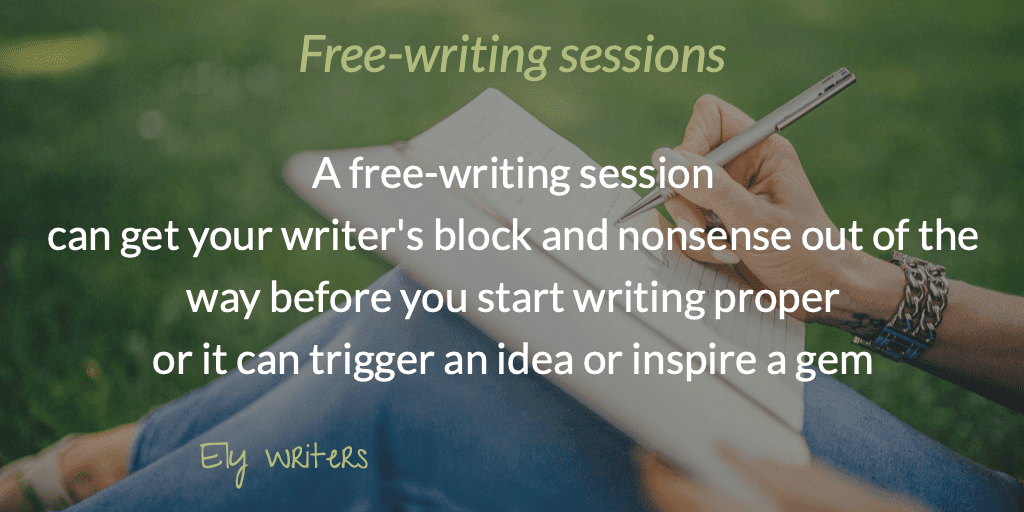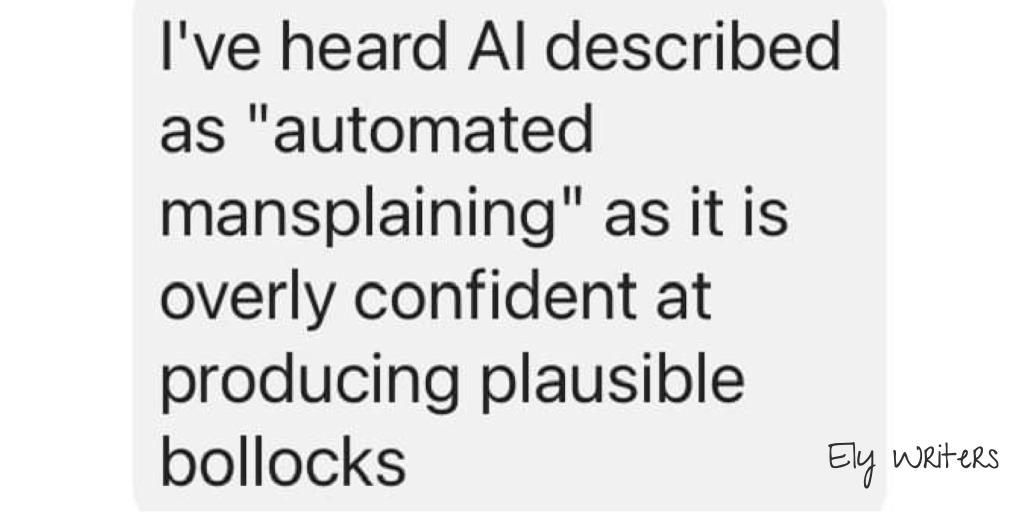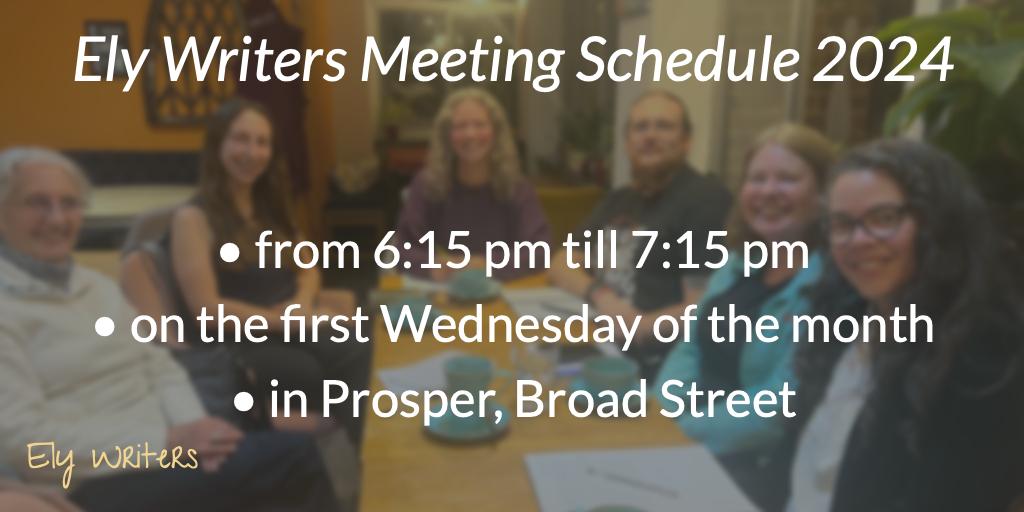Apologies for this month’s meeting review being late: there were technical difficulties with the site. The database decided it didn’t want to play anymore, so we gave it a stern talking to, and it’s promised to change its ways.
As St Valentine’s Day falls in February with surprising regularity, we thought we’d have a vaguely love-themed meeting.
Ten Ely Writers turned up, including some new faces, which we always like to see. We also like to see people coming back, so if you’ve been to one of our meetings before and you got something out of it, why not come to our March meeting?
Introductions and progress reports
Caity has had a good month, adding 2,500 more words to her novel. She came to an abrupt halt when her main character asked a character she’d just met a question – Caity didn’t know the answer! Caity’s plan is to have a scribble chat with the mystery character to find out all his secrets. She’ll use this to resume the conversation afterwards.
A relatively new member has spent the last four years writing a macabre story. We’re intrigued to hear a sample, but there’s no obligation to read your work out at our meetings.
This month’s first new member has written about 20,000 words of a memoir. Memoirs can be difficult to write because of the emotion they drag up from the past, but she’s made a good start.
We have another memoir writer has written lots of threads, but hasn’t yet found a way to weave them together into a coherent piece. Maybe we’ll have a brainstorming session at some point to help him out when he’s ready.
Our MA Creative Writing student is no longer a student: she has successfully completed her degree – congratulations! She’s having a break from writing, then will return to work on the novel she started while studying.
Our resident zombie-apocalypse guy is cracking on with book three in his series, while getting the first book ready for publication. Exciting stuff!
Another relatively new Ely Writer is writing a novella, which may or may not become a ghost story. She asked for feedback in last month’s meeting, and has taken that on board. We’re glad we could help!
Our second new member hasn’t written much, but is curious to see if she’d be any good at it.
Finally, our third new member writes horror and murder mysteries, and is currently working on a story in the latter category.
We’re keen to watch the talents of all these lovely Ely Writers develop over time, and to see where their writing leads them.
Free writing
The prompt for this month’s free-writing session was heart.
A heart can be literal or metaphorical. It can be the bodily organ – human or non-human. It can represent love, which isn’t necessarily romantic. It is one of the suits in a deck of cards. There are many ways to interpret this month’s prompt, and we were fascinated to hear what the Ely Writers wrote.

We don’t have to read what we write out, but a few brave souls did.
Caity started off by saying how she got on, then realised she might as well have read it out. While scribble-chatting with her character, she’d discovered he didn’t like biology at school, so she wrote about him having to dissect a heart in class.
Two people wrote poems about what the heart means to people – life and death, for example. They were both powerful pieces that explored what it means to be human. This is the first time that two writers have written something similar from the free-writing prompt!
If you’re sick of staring at a blank page, why not set a timer for five minutes, and take the first thing you focus on when you look up as your prompt, and see where it takes you. Perhaps you’ll write about how your character would react to the prompt. Perhaps you’ll write about what it means to you. The result may be good or it may be guff, but at least your page isn’t blank anymore.

Discussion: AI
One of the Ely Writers wanted to talk about artificial intelligence (AI) with respect to creativity. We’ve discussed AI before, but AI continues to be relevant. Our member wanted to share a talk by Dr Lynda Clark about using AI writing tools to amplify creativity1. We didn’t have the time or the tools to watch the during the meeting, so we couldn’t comment on it then. However, we did have lots of other things to say about AI and creativity, including having a laugh at an anonymous quote one of us shared with the group:

We discussed how we’ve used AI, typically not to write on our behalf, we’re happy to say!
Some of us have used AI image-creation tools for cover designs and character portraits, but not with success. The user who’d created a cover design for her book was unimpressed, and said they’d rather hire a human artist. As far as character portraits are concerned, they’re very one-dimensional and heavily biased. There are also problems concerning the use of images for training without permission, much as there are issues with writing being used for training without permission. AI has also been used to write new books by
authors2.
Some software, like ProWritingAid3, can sit alongside your writing in your word processor and show you what works and what can be improved. This may work, but this advice must be based on the opinions of someone – but who?
There’s an AI tool designed to help with character creation: Character AI4, currently in beta. Caity and one of this month’s new members have both played with this before. The former wanted to add existing characters and effectively have a scribble chat with them like she’d have on paper. However, because they refused to accept their fictional reality and created their own, it became frustrating quickly. The latter, on the other hand, found it useful as a tool for character generation.
Workshop: writing about love
We discussed love and how to write about it. We considered the different types of love:
- romantic
- unrequited
- familial
- platonic
- of money
- of possessions
- religious
- including agape
- limerent
- of self, narcissistic
- of pain
- of parasocial interactions
What other kinds of love can you think of?
We noted that love can be good or bad, innocent or twisted, healthy or toxic.
There’s also the absence of love to consider, like an orphan who has to live in an orphanage or with relatives who don’t want them, like Pip in Great Expectations5.
Then we looked at how to describe love in writing. For this, we looked at the internet for some tips6. It seemed to us that a lot of the points listed in this article were similar to each other and could be merged.
What they all boiled down to was to show characters being in love, rather than telling the reader that they’re in love, to put the reader in the room with the characters. Use emotions and actions to show the reader the love between two characters, no matter what type of love it is. Show how your character’s actions, decisions and sacrifices reveal their true feelings – are they the same as those they claim? Small acts of love can show a more genuine, honest love than showy acts. Ensure that these are all within character – a shy person is unlikely to make great, flourishing speeches in public about their love.
Not everything needs to be shown – no one knows what goes on in someone else’s relationships, so give hints, then let the reader use their imagination for the rest. Use understatement and keep it simple – don’t over-explain or over-describe so as not to kill the mood.
Set the two characters in a dance, where they move towards each other in joy or sadness, then yank them apart as obstacles come between them – other people, internal or external conflict, disagreements and arguments, distance, etc. What emotions come to the surface?
Show how your character notices things about the character they love that others don’t. Conversely, show how your character is blind to things about the character they love that other’s aren’t.
What about love at first sight? Focus on the details that make your characters fall for each other: physical attributes, mannerisms, other characteristics. Or is it love at first hearing? Perhaps they heard someone laughing and their heart skipped a beat. Show the rush of emotions caused by that first encounter. Think about the pacing, remembering what we said above: do you want the reader to know straight away the full force of the character’s feelings? Does the other character feel the same way or is it unrequited?
Writing about unrequited love is about showing the emotions involved, the bittersweet feelings that arise when they see, hear or think about the object. Is the object of your character’s love aware of this love? How do they feel about it? Is it awkward when they’re together?
Finally, a question was posed to the group:
Is romantic love required in every story?
The answer was a unanimous no
.
Instead it was suggested that stories need connections, perhaps platonic love, rather than romance. What do you think?
Readings
We had two readings this month, one from a relatively new member and one from a brand new writer. One was a beautifully poignant piece, happy–sad; the other was full of emotion brutally shoved in your face.
I’ve said it before, and I’ll say it again: Ely Writers are good at this writing malarkey!
Any other business
The Ely Writers podcast is now available to listen to.
Prosper where we have our meetings now has their very own website! If you have a nosey around, you’ll find our meetings on their events and workshops page.
Artemis Writers present a poetry-writing workshop: Time and change on Tuesday 5 March 2024 in The Yard by Silver Oak.
Caity forgot to mention that the short piece that she read out has been published in the Churchill Review7.
Next meeting
We had a fun and informative meeting this month, and I think we all got something out of it, even if it was only hearing some marvellous readings. Why don’t you come along to our next meeting to see what you might get out of it – and contribute to it – next month?
Our meeting next month is from 6:15 pm till 7:15 pm on Wednesday 6 March 2024 in Prosper.
References
- . Creativity Amplifications: a writer’s technological toolkit. Anglia Ruskin University.
- . I would rather see my books get pirated than this (or why goodreads and Amazon are becoming dumpster fires) at Jane Friedman. Accessed .
- ProWritingAid. https://prowritingaid.com.
- Character AI. https://character.ai.
- . Great Expectations.
- no date. How to Describe Love in Writing (21 Best Tips + Examples) at Writing Beginner: tips and tricks. Accessed .
- . Mrs G in Churchill Review 60A, 192.
